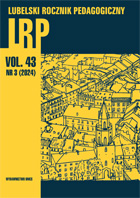COMPARISON OF THE PROFESSIONAL COMPETENCIES
OF STUDENTS PREPARING FOR THE PROFESSION OF
PRESCHOOL AND PRIMARY SCHOOL TEACHERS UNDER
DIFFERENT FORMS OF STUDY
COMPARISON OF THE PROFESSIONAL COMPETENCIES
OF STUDENTS PREPARING FOR THE PROFESSION OF
PRESCHOOL AND PRIMARY SCHOOL TEACHERS UNDER
DIFFERENT FORMS OF STUDY
Author(s): Barbara Surma, Irmina Rostek, Estera Twardowska-StaszekSubject(s): Sociology of Education, Pedagogy
Published by: Wydawnictwo Naukowe Uniwersytetu Marii Curie-Sklodowskiej
Keywords: competence; teacher competence; emotional intelligence; preschool teacher; primary school teacher;
Summary/Abstract: Introduction: The reform of higher education and especially of teaching faculties in recentyears has introduced significant changes aimed at improving the quality of professional pre-paration and acquiring the necessary teaching competencies and qualifications. This articlepresents the results of a study on the self-assessment of professional competence, conductedamong female students of full-time and part-time second degree programs.Research Aim: The purpose of the study was to compare the self-assessment of the professionalcompetence of those preparing to become preschool and primary school teachers under diffe-rent forms of study.Research Method: The study used the Popular Questionnaire of Emotional Intelligence (PKIE),the PROKOS Questionnaire, the Self-Assessment of Teaching Competence survey questionna-ire and the author’s survey questionnaire.Results: The study of female students graduating with a degree in pedagogy and preschool andprimary school education showed no statistically significant differences in emotional intelligen-ce and social competence. Statistically significant differences occurred only in two cases in the assessment of their own teaching competence (cooperation with parents and knowledge of thefield of mathematics teaching).Conclusions: In order to reduce the differences in the assessment of substantive competenciesin science subjects, it is necessary to involve students more in non-formal further educationactivities, and in the framework of internships to take into account the need to develop thecompetence of cooperation with families (especially full-time students).
Journal: Lubelski Rocznik Pedagogiczny
- Issue Year: 43/2024
- Issue No: 3
- Page Range: 101-117
- Page Count: 17
- Language: Polish

